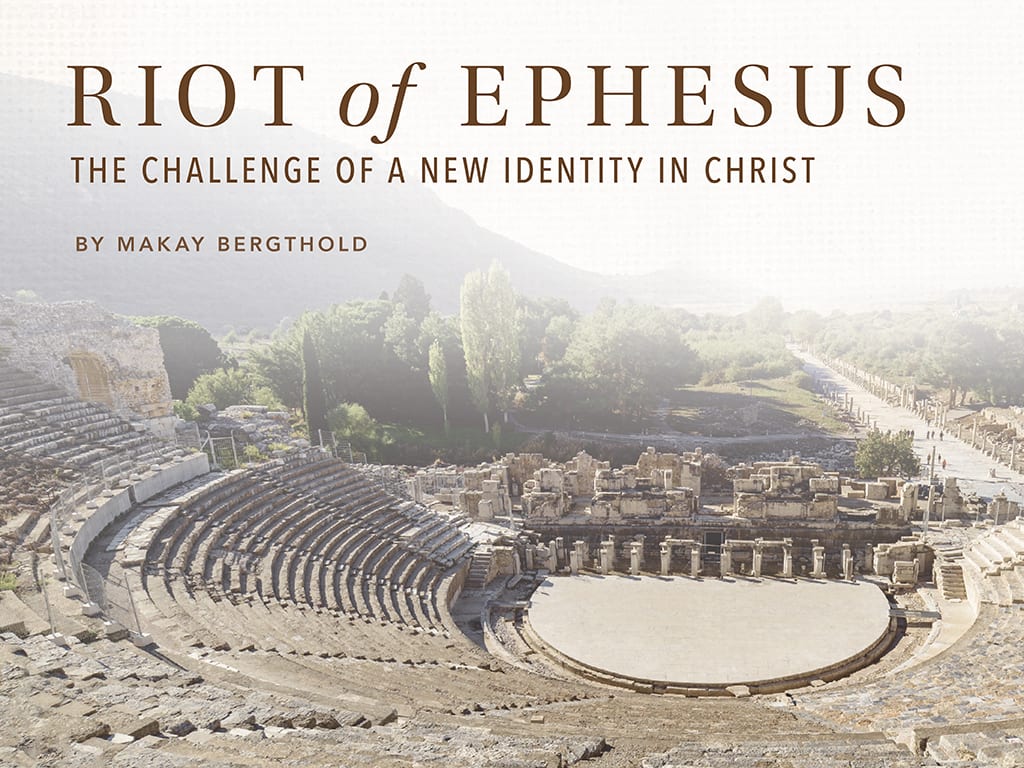Riot of Ephesus: The Challenge of a New Identity in Christ

Excavations at Ephesus enable us to picture what we read in Acts. Archaeologists have discovered the 25,000-seat amphitheater, the setting of the riot. The Romans modified the shape of the original Greek theater from a horseshoe to a semicircle. They also added a skene, a wall across the back of the stage that rose to the height of the stadium’s top row of seating. Because violent competitions were central to Roman entertainment, a protective wall was erected in front of the lowest two seating levels. All of these changes intensified the audience’s experience: the walls held the sound inside the theater space, magnifying each moment of an event.
The theater in Ephesus was marvelous, consistent with the city’s reputation for wealth and power. Inscriptions excavated throughout Ephesus bring additional light to the complex religious and political situation Paul faced there. Several inscriptions mention the term Asiarch. Asiarchs were officials who served in a political and religious capacity; inscriptions frequently connect the office with the imperial cult. One inscription includes the phrase “Asiarch [high priest] of the temple of Ephesus.” From these inscriptions, we observe Roman society’s integration of government, religion, and economy. Paul’s teaching, therefore, not only called people to a radical shift in their religious beliefs, but it also had economic ramifications. We see this reality demonstrated in Demetrius’s response (Acts 19:24–27). As a silversmith, he knew his wealth was directly tied to the cult of Artemis. Naturally, he and his fellow craftsmen feared a decline in their financial prosperity as people turned from Artemis to Christ and ceased purchasing the small silver replicas of Artemis’s temple in Ephesus.
Other citizens echoed Demetrius’s fears that worshipers of Artemis around the world “will suffer the loss of her greatness.” They believed the city’s prosperity was determined by Artemis’s favor. Unsurprisingly, then, they sought to defend her name. The people seized Paul’s companions and rushed into the theater, where for about two hours they defiantly shouted, “Great is Artemis of the Ephesians!” (19:29, 34). Their words reverberated powerfully around the walls of the theater, proclaiming the people’s dependence on their collective social identity: “the city of the Ephesians…keeper of the temple of the great Artemis” (19:35).
Along with seeing the challenge to Ephesus’s religious and economic system posed by early followers of Jesus in “the Way,” officials were concerned with the city’s political stability within the empire. The city secretary led an effort to maintain political and social order by arguing that Paul and his disciples were innocent of misconduct and that the people should settle their dispute lawfully. If accused of fostering disorder, the citizens risked jeopardizing the freedom and privileges they enjoyed under Roman rule. The secretary’s speech successfully persuaded the mob to disband and leave the theater.
Relying on their religious identity and seeking to maintain control over their political stability and socioeconomic status, the Ephesians’ source of security was tragically misplaced. The chaos that erupted in the city and generated the riot in the theater illustrates the ultimate end of clinging to our own means of security rather than submitting to God as the highest authority. This event demonstrates the frailty and insecurity of living outside of God’s leadership. The gospel challenged the Ephesians to lay down their trust in Artemis for prosperity and instead step into the freedom that comes only through the rule of Christ. We were designed to give our ultimate allegiance to God as King. Surrendering to His authority as our perfect leader brings peace and empowers us to be His ambassadors in our positions of service on the world stage.
About the Contributors

Makay Bergthold
Makay is an MBTS student and web content coordinator at DTS. She graduated with a BA in history from the University of Missouri-Kansas City in 2019 and participated in graduate studies at the Hebrew University of Jerusalem before joining DTS. Currently, she and her husband live in Kansas City, MO, and are honored to partner with their local church in furthering the gospel in their community.

